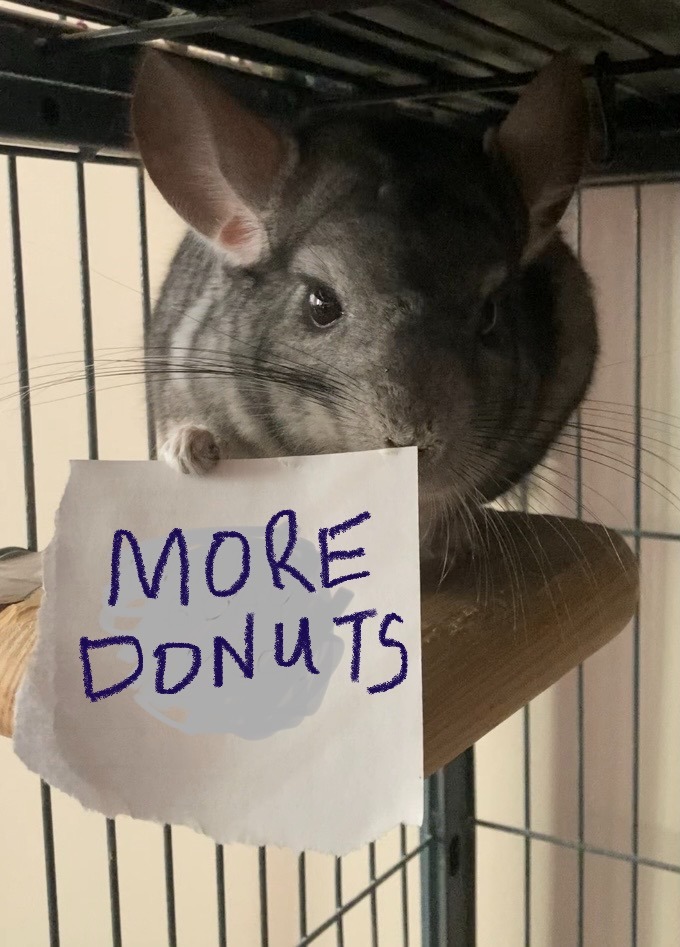Given how things are these days, I fear this would be the day you'd be forced to go into work to make up for any wfh you do.
tunetardis
Can't say I'm surprised by the push to plastics given the 25% tariff on aluminum.
That's cute!
My daughter has a chinchilla who likes to hold up signs like this.
 .
.
Climatology and meteorology are separate disciplines with their own very different modelling. I studied the former way back when, and it wasn't even in the same department at my university (geography vs physics). Climatology is about long-term trends and focuses more on energy fluxes, general circulation patterns (both in the atmosphere and oceans), the hydrological cycle, the carbon cycle, etc. Meteorology is about the near-term. It focuses on the fluid and thermodynamics of specific weather systems, and how to process/interpret real-time data.
Yeah. I think it started when I was playing 2nd violin in a community orchestra. I'd get lost and think just keep playing and look like you know what you're doing. As long as it doesn't clash…
Then I joined a band and they said there are no rules here. Make up whatever you want to go with the song. I was in Heaven!
One time, I was at some kind of open mic thing and an old guy walks up, introducing himself as the official city poet laureate. (Yes, that turned out to be legit!) He started reciting a poem about a local historic event and before you know it, I was playing along. He looked at me but continued. I think it sounded vaguely like something you might hear in a Ken Burns documentary, and when he was done, he came over.
Wow, that fit the words perfectly! What piece did you choose?
Oh what? No I just made it up on the spot.
Really! Could you play it again?
Yeah, no. But if someone made a recording, I'm sure I could harmonize to it! 👍
I can play a spontaneous and convincing harmony on my violin to any song I hear. Sometimes I can even do this as I'm hearing a new song for the first time and trying to join in. I also suck at reading sheet music, so this could be a survival adaptation?
I can't find where I read this now, but my recollection is that in the previous round of tariffs, China not only implemented tit for tat counter-tariffs which I imagine Trump had been expecting, but took some additional measures like export controls on rare earths. Like it or not, they basically own the global market and Trump had no answer to that other than to threaten even more tariffs. And here we are.
I've been playing around with the free-threaded build of 3.13 and it seems pretty stable with the standard library at least. Most of what I've read suggests the only problems have been with 3rd party libraries that make unsafe assumptions about the GIL being around. But I've tried it out with my own production code and it's been rock solid and performant (at least by Python standards).
It sounds like they did some gene editing to select characteristics the dire wolf supposedly had, as opposed to finding an ancient DNA sample somewhere and working from that. So it's more of a genetic simulation than the real deal right?
Like just because you know of some gene that happens to give people pronounced brow ridges doesn't mean you can bring back the Neanderthal. Or am I not understanding this correctly?
I see what you're getting at here. The solar constant is the solar constant. If you've got a perfect angle to the sun, you should be getting the same amount of power regardless of latitude. I mean I suppose it's possible there might be a slight attenuation with the sun at a lower angle due to there being more atmosphere to traverse? Otoh solar panels don't function as efficiently at high temperatures, so it's possible they may be more efficient in some cases.
But you have to consider that averaged out, you're looking at shorter daylight hours overall at high latitudes, even if there are periods in mid-summer when days can be super long, so that's a consideration. So yes, the panels should pull in similar amounts of power while the sun is up, but it's not up as much.
My choirmaster years ago taught us that raising your eyebrows actually does help you reach the top of your vocal range, so that might actually be technique? Though I'm not a professional singer by any stretch, so who am I to say.
I saw one of these on display at the Musical Instrument Museum in Phoenix AZ, but never heard one played. It's so huge you can't reach those frets at the top there, so the inventor had to come up with a keyed mechanism you see the guy working in the photo.